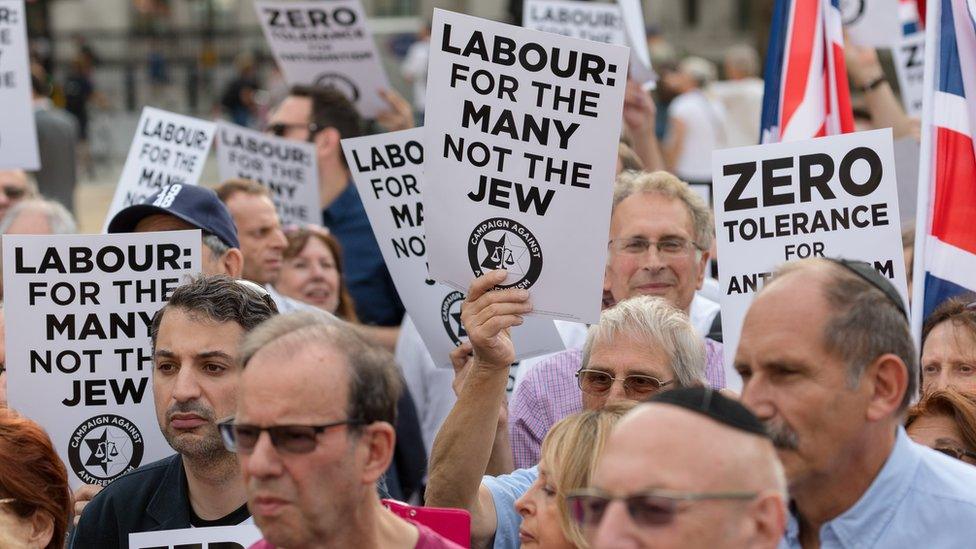Labour leadership: Call to resolve Anti-Semitism cases in four months
- Published

Labour has faced protests from Jewish groups over its handling of the issue
Labour's new leader must resolve all anti-Semitism cases within four months, the Board of Deputies of British Jews has said.
Board President Marie van der Zyl, said she wanted to have a "strong working relationship with the new leadership".
But in an article in The Times, external, she said she needed to see "words [transformed] into actions" on tackling the issue.
Labour will be announcing its new leader and deputy on Saturday.
Outgoing party leader Jeremy Corbyn has repeatedly vowed to root out anti-Semitism in the party and has beefed-up complaints handling procedures, although critics say they do not go far enough.
The three candidates in the running for the to replace Mr Corbyn are Sir Keir Starmer, Rebecca Long-Bailey and Lisa Nandy.
'Clear timetable'
The party has had to scale back the announcement due to the coronavirus outbreak, cancelling a special one day conference it had planned and asking the candidates to record victory video messages ahead of the result.
At the start of the leadership contest, the Board of Deputies issued a list of 10 pledges it wanted the candidates to sign up to, including making the internal disciplinary process independent and to settle all outstanding anti-Semitism cases by a fixed deadline.
In her article, Ms van der Zyl outlined her "clear timetable for action" of resolving cases within four months so Labour could "work to repair itself and once again become a place where Jews feel welcome".
She called on the party to "closely" look at a number of areas when it came to anti-Semitism, including the leader of the opposition’s office, Labour's headquarters, the National Executive Committee and the shadow cabinet.
Ms van der Zyl also said many of the "most egregious examples" of anti-Semitism had come from "grassroots members of the party", and she expected the new leader to put in disciplinary measures for whole branches of Labour, as well as individuals, to ensure "swift action".
Protests
She said the Board of Deputies wanted Labour to "continue in good health for many more years to come", but added: "We believe that it can only have the hope of doing so if the new leadership draws a firm line under the behaviours which were allowed to survive and thrive by the previous leadership."
All of the candidates have committed to implementing the recommendations of an ongoing inquiry into the issue by the Equality and Human Rights Commission, external (EHRC).
The watchdog launched the probe into whether the party had "unlawfully discriminated against, harassed or victimised people because they are Jewish" in May last year. It is due to report on its findings early in 2020.
Labour has been embroiled in a row over allegations of anti-Semitism since 2016, when the outgoing leader, Jeremy Corbyn, announced an inquiry into the issue and other forms of racism in the party.
The allegations led to protests against the party by its own members and a number of its MPs leaving.
Mr Corbyn apologised to the community after the row was reignited during December's election campaign.
We have contacted each leadership candidate for their response.